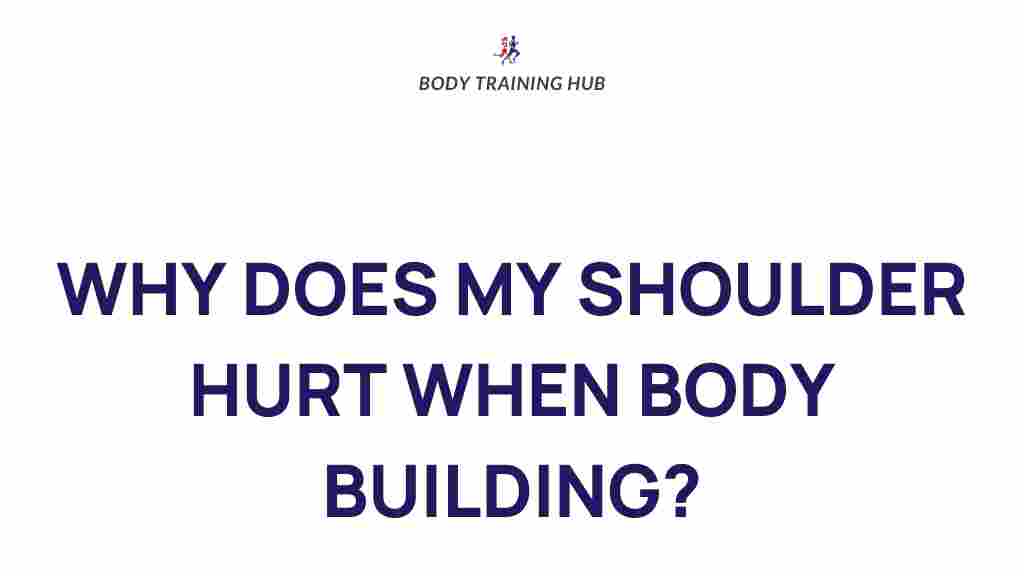Unraveling the Mystery: Shoulder Pain While Bodybuilding
Shoulder pain is a common complaint among bodybuilders, often arising from the rigorous demands of intense workouts and improper form. Understanding the causes of shoulder pain while bodybuilding is crucial for injury prevention and achieving your fitness goals. This article will delve into the intricacies of shoulder pain, focusing on workout form, muscle imbalances, and effective strategies to prevent injuries.
The Anatomy of Shoulder Pain
The shoulder is a complex joint composed of bones, ligaments, tendons, and muscles. It provides a wide range of motion, making it susceptible to injuries. Understanding the anatomy of the shoulder can help bodybuilders identify potential problems and prevent injuries.
- Rotator Cuff: This group of muscles stabilizes the shoulder and allows for its movement. Injuries to the rotator cuff are common and can lead to significant pain and dysfunction.
- Deltoids: The deltoid muscle covers the shoulder joint and is primarily responsible for lifting the arm. Overtraining or poor form can lead to deltoid strain.
- Scapula: The scapula (shoulder blade) plays a critical role in shoulder movement and stability. Weakness in the muscles surrounding the scapula can contribute to shoulder pain.
Causes of Shoulder Pain in Bodybuilding
Identifying the root causes of shoulder pain can help bodybuilders adjust their training regimens to avoid injury. Here are some common causes:
1. Improper Workout Form
One of the leading causes of shoulder pain is improper workout form. Lifting weights without maintaining correct posture can place undue stress on the shoulder joint.
- Overhead Pressing: Pressing weights overhead with poor alignment can lead to shoulder impingement.
- Bench Press: Flaring elbows during the bench press can strain the shoulder joints.
2. Muscle Imbalances
Muscle imbalances occur when certain muscles are stronger or more developed than their opposing muscles. This disparity can lead to improper movement patterns and increase the risk of injury.
- Weak Rotator Cuff: A weak rotator cuff can lead to instability and pain during lifting.
- Overdeveloped Pecs: Strong chest muscles without corresponding back strength can pull the shoulders forward, leading to pain.
3. Overtraining and Fatigue
Bodybuilders often push their limits, which can result in overtraining. Fatigue can compromise form and lead to injuries.
4. Previous Injuries
Past injuries can predispose the shoulder to future pain. Scar tissue and weakness from previous injuries may affect movement and increase pain during workouts.
Injury Prevention Strategies
Preventing shoulder pain while bodybuilding is essential for long-term success. Here are some effective strategies:
1. Focus on Proper Workout Form
Ensuring proper form during exercises can significantly reduce the risk of shoulder pain. Here are tips to maintain proper form:
- Keep your elbows tucked in during pressing movements.
- Engage the core to stabilize the spine.
- Use a full range of motion without compromising form.
2. Strengthen Supporting Muscles
Incorporating exercises that strengthen the rotator cuff and scapular stabilizers is vital. Some effective exercises include:
- External Rotations: Use resistance bands or light weights to strengthen the rotator cuff.
- Face Pulls: This exercise targets the rear deltoids and upper back, promoting balance.
- Scapular Push-Ups: This variation of push-ups focuses on scapular stability.
3. Incorporate Flexibility Training
Increasing flexibility in the shoulder joint can help prevent injuries. Consider incorporating these practices into your routine:
- Dynamic Stretching: Perform dynamic stretches before workouts to prepare the shoulders.
- Static Stretching: Engage in static stretching post-workout to improve flexibility and reduce tension.
Adjusting Your Bodybuilding Program
Sometimes, adjustments to your bodybuilding program can help alleviate shoulder pain. Here’s how:
1. Modify Your Exercises
Switching up your exercises can relieve stress from the shoulders. Consider alternatives:
- Instead of overhead presses, try dumbbell lateral raises to target the deltoids.
- Incorporate incline bench presses to reduce strain on the shoulders.
2. Prioritize Recovery
Ensure that you are giving your body adequate time to recover. Recovery strategies include:
- Taking rest days to allow for muscle recovery.
- Incorporating active recovery techniques like light cardio or yoga.
3. Listen to Your Body
Paying attention to your body’s signals is crucial. If you experience pain during a workout:
- Stop the exercise immediately.
- Assess your form and load, and consider reducing the weight.
Troubleshooting Shoulder Pain
If you find yourself dealing with shoulder pain despite following preventive measures, here are some troubleshooting tips:
1. Assess Your Pain Level
Determine whether the pain is acute or chronic. Acute pain might require immediate rest and assessment, while chronic pain may need a more comprehensive approach.
2. Seek Professional Help
If shoulder pain persists, consider consulting a medical professional or physical therapist. They can provide tailored advice and rehabilitation exercises.
3. Consider Cross-Training
Engaging in different types of workouts can help balance muscle development and reduce overuse injuries. Activities such as swimming, cycling, or yoga can maintain your fitness while giving your shoulders a break.
Conclusion
Understanding the causes of shoulder pain while bodybuilding is essential for injury prevention and overall performance. By focusing on proper workout form, addressing muscle imbalances, and incorporating effective prevention strategies, bodybuilders can minimize their risk of injury. Remember to listen to your body and seek professional advice when necessary. With the right approach, you can continue to pursue your bodybuilding goals while keeping shoulder pain at bay.
For more information on preventing injuries during your workouts, visit this resource for expert insights.
This article is in the category Strength & Recovery and created by BodyTraining Team
